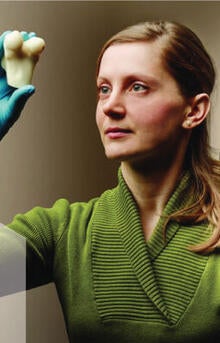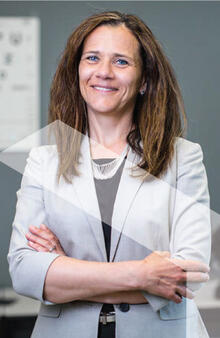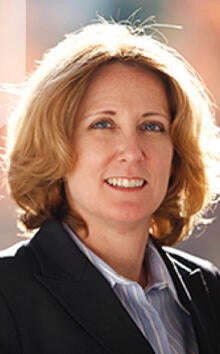As Canada's aviation sector struggles through post-pandemic turbulence, a major University of Waterloo initiative has taken off to offer it stability - and even clearer skies ahead. Since its founding in late 2021, the Waterloo Institute for Sustainable Aeronautics (WISA) has assembled a diverse, multidisciplinary team of more than 100 academics pooling world-class talents to deal with the challenges facing this vital industry, all while mentoring a new generation who will continue the job.
"There's a crisis in the industry," explains Dr. Suzanne Kearns, WISA's founding and current director, and a renowned aviation academic. Among the existential problems confronting the aviation sector, she lists a chronic shortage of professionals and "the negative environmental impact of the industry," mainly due to its role in driving climate change. She also cites the "rapid evolution of global technology that challenges the safety and integrity of the industry." These weaknesses existed before COVID-19, but years of pandemic disruptions exacerbated them.
In Kearns' words WISA's response and mandate is "to be in service to the industry, to mobilize the research, technology and talent that exist at this University." Just as the threats to aviation are multi-faceted and complex, so must be the innovative solutions that will save it. That's why, to ensure the industry's future, WISA aims to make it sustainable - socially, environmentally and economically. And to do this, it's enlisting the expertise of academics from every faculty at Waterloo.
To understand how this cross-faculty, multidisciplinary strategy works, look at the six Waterloo academics who are helping WISA meet its goal.
Dr. Suzanne Kearns, founding director of Waterloo Institute for Sustainable Aeronautics; Associate Professor, Geography and Aviation, Faculty of Environment
 Kearns has a passion for flying planes - a passion she hopes is catching. When you realize she began earning her first pilot's license at the age of 15, then became an internationally-recognized aviation academic whose research focuses on education and improving pilot performance, that's not surprising.
Kearns has a passion for flying planes - a passion she hopes is catching. When you realize she began earning her first pilot's license at the age of 15, then became an internationally-recognized aviation academic whose research focuses on education and improving pilot performance, that's not surprising.
But it's not just that Kearns wants new generations of aspiring pilots to have a rewarding career and experience the sense of accomplishment she's known. She knows the future of Canada's aviation industry depends on getting more people into pilot seats.
There's a longstanding pilot shortage in this country. And to make it even worse, the demand for air travel rebounded in Canada after the end of the public health restrictions that grounded so many flights in the pandemic's darkest days.
The author of six books about learning theories for aviation careers, Kearns wants to topple the economic barriers that discourage many people from becoming pilots.
"Research could show that spending more hours in a flight simulator rather than an aircraft could make training cheaper and more customized for students," she says. It could also reduce fuel consumption, which would be good for the environment.
In addition, Kearns is convinced that one of the best ways to end the pilot shortage would be to ensure greater diversity in the workforce. There are relatively few women and racialized people becoming pilots.
"With the growth of the industry, supporting diversity and inclusion will fill empty pilot's seats and give passionate youth a pathway into an exciting career," Kearns says.
Dr. Elizabeth Irving, Professor, School of Optometry and Vision Science, Faculty of Science
 Irving is a vision scientist who creates more realistic, relevant vision standards for pilots to increase the pool of eligible professionals without compromising existing and essential safety standards.
Irving is a vision scientist who creates more realistic, relevant vision standards for pilots to increase the pool of eligible professionals without compromising existing and essential safety standards.
It's a formidable job. But, as an expert in eye movement and binocular vision who has assisted the Royal Canadian Air Force with its requirements for military pilots, she's up to it.
"If vision standards are too stringent, they cut down on the potential pool of pilots," she explains. Such rules could lock some young people out of an aviation career. They could also force the premature retirement of older pilots - which has her wondering what role experience should play when weighing the vision requirements for senior pilots.
"Preliminary data suggest there may be the ability to relax these standards."
Along with her love of research, Irving is committed to mentoring students in her discipline. "You lead by example, mostly," she says. "You show you can be in a discipline outside aviation and still positively influence on aviation."
She hopes this lesson is not lost on women who have so much to contribute to Canada's aviation industry. "I think that some of what we have done as women in the field paves the way for others," Irving says. "This work elevates WISA ... If we're not world leaders now, we will be."
Dr. Mihaela Vlasea, Associate Professor, Mechanical and Mechatronics Engineering, Faculty of Engineering
 Vlasea knows that one way to build a better aviation sector is to build better planes. And the Faculty of Engineering professor's expertise in metal additive manufacturing - popularly known as 3D printing - could be key to accomplishing this goal.
Vlasea knows that one way to build a better aviation sector is to build better planes. And the Faculty of Engineering professor's expertise in metal additive manufacturing - popularly known as 3D printing - could be key to accomplishing this goal.
Metal additive manufacturing produces parts by fusing materials together. The range of products produced this way is vast and could be utilized in a wide variety of industries, including the aerospace sector.
"We take a bucket of powder and put it through unique processes to create very tailored material properties and part designs that you cannot create using conventional techniques," Vlasea says, adding that there are clear benefits to this kind of manufacturing.
She believes the parts made through metal additive manufacturing might outperform what's being made by more conventional methods. For instance, lowering the weight of various parts while producing them more efficiently and increasing their durability could reduce costs for the industry. Such advances could also reduce the aviation sector's heavy environmental footprint, something that has become a prerequisite for doing business in the global climate crisis.
Vlasea knows she can't get the job done alone. "From powder all the way to parts, you need experts," she says. That includes specialists in metallurgy, design, production, modelling, sensors and instrumentation, and data science.
"We have the opportunity through the Waterloo ecosystem of researchers to leverage and showcase what we do for Canadian industry," she says. "WISA brings together the university network and transfers knowledge from it to external partners."
Dr. Anita Layton, Canada 150 Research Chair in Mathematical Biology and Medicine, Department of Applied Mathematics, Faculty of Mathematics
 Layton is an internationally acclaimed professor of applied mathematics, and she takes pride in her ability to build bridges.
Layton is an internationally acclaimed professor of applied mathematics, and she takes pride in her ability to build bridges.
To be precise, she connects the theoretical development and experimentation that take place at Waterloo with some of the most urgent needs being experienced off-campus and across the country. Or, as she explains, her research "focuses on applying computational modelling and machine-learning techniques to solve real-world problems."
At WISA, Layton uses that expertise to support Canada's aviation sector as it faces powerful social, environmental, economic and technological headwinds. There's broad agreement the industry must become more sustainable. One of its greatest challenges is reducing its carbon emissions, which are huge contributors to global warming.
Airlines and airports already have their own strategies in these areas. They leverage new technologies such as machine learning and automation, pursue smarter data analytics and use space-based surveillance to generate intelligent flight planning. All this improves the efficiency of air-flow traffic management. Yet, we can do better.
One problem is that solutions based on data from one specific region or airport can perform poorly when applied elsewhere. In response, Layton wants to develop a new method "to generalize flight arrival prediction models, allowing models trained on data-rich regions to be transferrable to a different, data-poor region."
Layton hopes this project will identify the most efficient routes at the optimum altitude and speed. By filling existing knowledge gaps, her work can also ensure smoother arrival and departure flight profiles at airports and reduce delays.
The would result in a more robust, sustainable, and environmentally-sound aviation sector.
Dr. Ewa Niechwiej-Szwedo, Associate Professor, Department of Kinesiology and Health Sciences, Faculty of Health
 One of the toughest questions facing Canada's aviation industry today is, where will it find enough pilots to meet the needs of tomorrow?
One of the toughest questions facing Canada's aviation industry today is, where will it find enough pilots to meet the needs of tomorrow?
An expert in gaze behaviour whose research is rooted in complex systems of neuroscience, Dr. Ewa Niechwiej-Szwedo is busily working to provide at least one answer. It involves developing a new and more effective system of training pilots that is based on their competency. Making that happen, however, is the tricky part, and, as Niechwiej-Szwedo explains, it "hinges on having a reliable and valid means to measure competency."
Her expertise in eye movements, eye-hand co-ordination, upper limb kinematics and visual processing will be essential in achieving this goal. Working with a group of scientists in WISA, she uses computational tools and eye-tracking technology in an on-campus flight simulator. Over time, the team could develop competency-based education where a student's abilities would be directly measured and used to determine progress, which would replace relying on more arbitrary standards, such as the number of flight hours a student logs.
The competency-based education approach "could make training more efficient in cost and time, and the assessment unbiased," she says. If that happened, it could make pilot training less expensive and time-consuming. That could open the career path to underrepresented cohorts such as women.
"Our work will facilitate development of individualized training and evidence-based assessment standards, which is the first step toward advancing next-generation aviation education," she says. "Given the potential shortage of pilots, our research has the potential to contribute to a more sustainable and technological future."
Dr. Elizabeth Demers, Professor, School of Accounting and Finance, Faculty of Arts
 Demers is a Waterloo professor of accounting with a vital message for Canada's aeronautics sector. "In today's world, what big business does is everybody's business."
Demers is a Waterloo professor of accounting with a vital message for Canada's aeronautics sector. "In today's world, what big business does is everybody's business."
If that doesn't sound as relevant to the future of Canadian aviation as the next engineering breakthrough, it should. Demers is an expert in the three letters revolutionizing how business is conducted, ESG.
The letters stand for environmental, social and (corporate) governance. Principles that could unite profitability with responsibility and sustainability, they're increasingly the lens through which investors look when deciding where to spend their money.
Demers wants to use ESG to transform aviation for the better. To pick one example of how this could work at a time when the aviation industry needs more pilots, is to look at gender disparity. Currently, the vast majority of commercial pilots are men.
"It makes sense to expand the pool you're drawing on to include 100 per cent of the population," Demers says. "I would be in favour of a commercial airline that installed policies to attract women and that would expand the pilot pool."
There could be a significant corporate payoff for an airline that did this. If external rating agencies raised the airline's ESG score, the firm's cost of capital could drop. Additionally or alternatively, they could attract better or more loyal talent, and/or more customers who also favour such socially progressive and inclusive policies. But the airline's adherence to ESG principles, in this case, would also benefit the industry, consumers and the cause of social equity.
"It is a massive paradigm shift in how we do business in society today," Demers says. "There are ways to show this can pay off and get people and planet issues put forward."






